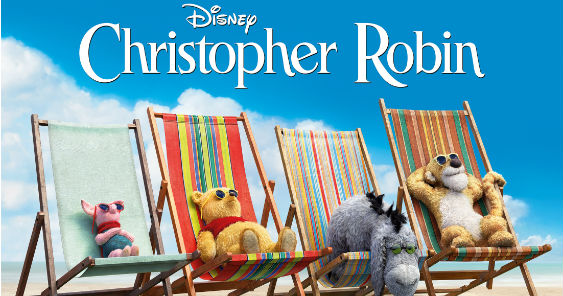As kids, most of us grew attached to particular toys that we constantly played with. We’d come up with crazy make-believe scenarios where we’d be the hero rescuing the toys who are in danger and we’d always have our happy endings. Growing up, we tend to leave those toys behind and the spark of magic that allowed us to see them more as just toys usually dims. When the most famous stuffed toy and his friends are forgotten by the boy who always played with them, do they just fade away or do they stay in that imaginary world, always waiting for the boy to return and re-ignite that spark?
Disney’s Christopher Robin is a direct sequel to the many Winnie the Pooh feature films and TV shows that Disney has released since purchasing the rights from author A.A. Milne’s family in 1966. Thus, the cartoon versions that most of us grew up with are the basis for these versions of the characters and their settings in the Hundred Acre Wood. Most of the original voice cast have since passed on, but several of the voice cast from the recent Winnie the Pooh movies were tapped for this film to provide a near-seamless transition.
Christopher Robin (Ewan MacGregor) gets sent away to boarding school and his friends in the Hundred Acre Wood throw a party to bid him goodbye. As he reaches adulthood, Christopher meets Evelyn (Hayley Atwell) and marries her before being drafted to serve in World War II. Exposed to the harshness of war, Christopher comes home to London and Evelyn and his daughter Madeline. Finding work at the Winslow Luggage Company, he finds himself consumed by work and often neglecting his family. Under pressure from his boss, Giles Winslow (Mark Gatiss), Christopher is forced to work on a weekend that he promised to take Evelyn and Madeline (Bronte Carmichael) to his childhood home in Sussex. Thus when his old stuffed toy Winnie the Pooh (Jim Cummings) shows up to try and cheer him up, Christopher fears that he’s losing his mind. As Christopher tries to return Pooh to the Hundred Acre Wood, he finds that things have turned gloomy in the forest and that his friends are missing. Even as he tries to reunite Pooh with the others, Christopher still has to fix a financial crisis at the luggage company, all while still showing his wife and daughter that they matter more to him.
It would be no stretch to say that Christopher Robin pushes all the right buttons regarding nostalgia, memories of childhood, and thinking about lost innocence. Much like Steven Spielberg’s 1991 film Hook, this movie wonders what happens when the boy protagonist grows up and loses touch with the magic that occupied most of his world as a child. The struggle to perform responsibilities as an adult makes both Christopher and (in Hook‘s case) Peter Pan seem distant from their respective wives and children, making them wonder how they fell in love with these men in the first place. Just as Peter Banning had to return to Neverland to regain his powers and fly, Christopher Robin has to return to the Hundred Acre Wood and pretend and play act again in order for Eeyore (Brad Garrett), Tigger (Jim Cummings), and the crew to recognize their old friend.
Director Marc Forster and his team have found ways of using Pooh Bear’s perennial innocence to poke at Christopher Robin’s grown-up problems, seemingly simplifying the solutions to them in almost unreal ways. The affection that Christopher has for his old friends is captured by MacGregor, as is the pain he feels when he realizes that he has been forcing things on his wife and daughter that were also forced upon him previously. Since Disney does own the old films, when the first notes of the classic “Winnie the Pooh” theme song play, it calls to mind the same innocence that those movies did, making Christopher’s reunion with the “silly old bear” and his friends even more heartwarming. For old-school Disney fans, the characters look exactly like how the two-dimensional toons would look like if they existed in the real world so that bringing them to 1940s London provides for some pretty interesting and humorous sequences.
There is clearly a lot of love for the Winnie the Pooh stories and films by the filmmakers in creating this chapter of the story, and it will leave you smiling, perhaps with a tinge of sadness, but mostly with heartfelt good vibes, the way a jar of “hunny” would to a silly old bear.









